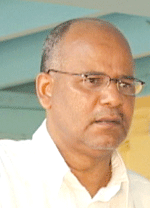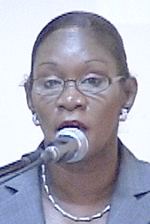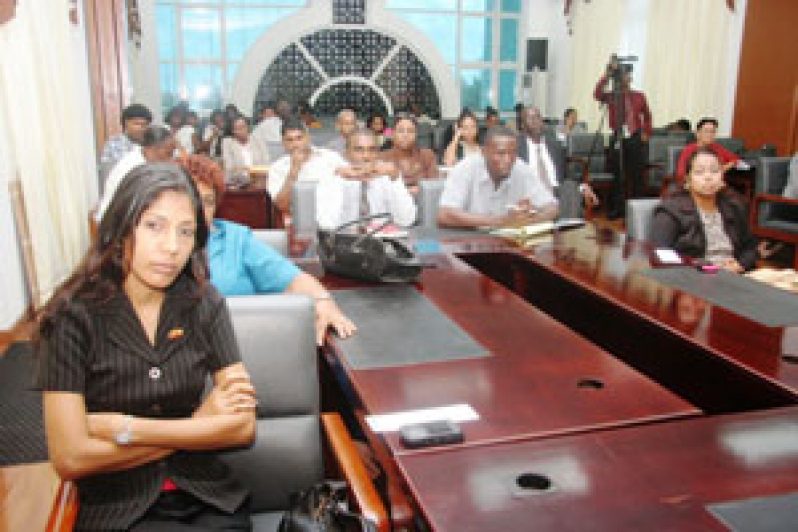THE Government of Guyana continues to intensify efforts to combat Trafficking in Persons (TIP), which is seen as a form of modern-day slavery. In this regard, the Ministry of Human Services and Social Security, in collaboration with the United Nations Development Programme (UNDP) yesterday commenced a three-day workshop on aspects of human trafficking.
 The workshop, which was held at the Guyana International Conference Center (GICC), Liliendaal, targets over 50 trainers, who will in turn be tasked with training people on the ground in the various regions on how to effectively identify and deal with TIP.
The workshop, which was held at the Guyana International Conference Center (GICC), Liliendaal, targets over 50 trainers, who will in turn be tasked with training people on the ground in the various regions on how to effectively identify and deal with TIP.
Minister of Human Services and Social Security, Jennifer Webster, in her remarks said that at the level of the ministerial task force on TIP, which is chaired by Minister of Home Affairs, Clement Rohee, the need for a robust response through partnership is fully recognised.
In this regard, the Human Services Ministry has been collaborating with organisations such as Help and Shelter and the Guyana Women Miners Association to fight this scourge.
“We are seeking to ensure that all our citizens in Guyana are made aware of the importance of the issue of TIP…our Government will spare no efforts to ensure that any reports of TIP are thoroughly investigated and perpetrators brought to justice,” Minister Webster said.
Human trafficking, which is committed predominantly on women and children, constitutes a serious threat to human rights and dignity and personal development. Thus far for this year, there have been six reports and three convictions through the judicial system.
The minister explained that all counter-actions to human trafficking must be as strong as the threat. She urged the participants to be firm in their resolve to prevent traffickers from making inroads in society.
“Let us be united on this issue and commit ourselves to working to ensure that we enable our people to not be lured by traffickers…let’s collaborate in a greater manner on this issue,” Minister Webster urged.
The Human Services Ministry will be constructing a shelter specifically to house victims of human trafficking. At this facility, victims will also be provided with life skills and other training opportunities, so as to empower them to  return to society and lead productive lives.
return to society and lead productive lives.
Meanwhile, Minister Rohee, in his remarks pointed out that the task force that was established at the ministerial level is testimony of the importance that the Government places on this issue.
He emphasised that, “the policy of the Government in respect to human trafficking is pellucidly clear; there is absolutely no equivocation on this subject…the policy of the Government of Guyana is to wage a consistent struggle against human trafficking.”
He explained that once an allegation of human trafficking can be proven by incontrovertible evidence, the perpetrators will be dealt with condignly.
The ministerial task force, in its annual report, states that it does not underestimate nor exaggerate the extent to which TIP exists in Guyana. Only recently, the membership of the task force was expanded with the addition of a representative from the Chambers of the Director of Public Prosecutions (DPP).
With regard to criticisms about Guyana lagging in terms of prosecutions, Minister Rohee stated that the police are constantly being exhorted to be more aggressive in dealing with the case files that are sent to the DPP and to prepare their cases more meticulously in order to ensure successful prosecution.
He also noted that the executive has absolutely no control over the judicial system, as such it cannot dictate to the magistracy or the judiciary how to carry out their functions.
He also emphasised the need for victims to be protected at all times, noting that they should not be given the kind of exposure that is often seen in the media.
“In whatever we do, there is always room for improvement and I am saying that however small or big that room is, let us find it and make the improvements. We have to be more aggressive…we cannot be reactionary, we have to go after information,” Minister Rohee maintained.
Deputy Chief of Mission at the United States Embassy, Bryan Hunt,spoke of the three ‘Ps’ paradigm (Prevention, Protection, Prosecution) with regard to human trafficking.
Human trafficking is an estimated US$32M per year global industry, after drug trafficking, it is the world’s second most profitable criminal enterprise. This is a status it shares with illegal trafficking in arms. In the last year, approximately 40,000 of the estimated 7,000,000 TIP victims were discovered and brought to light worldwide.
He lauded the efforts made by the Government of Guyana and civil society groups thus far in the identification and protection of victims of human trafficking.
“This year the Government of Guyana has made significant advances and delivered a severe blow to human traffickers. The Ministry of Human Services has continued to build awareness through countrywide activities…when we can stop this crime from happening in the first place, we are preventing the abuse of those who are victimised, as well as the ripple effect that causes damage to communities,” Hunt said.
UNDP Resident Representative, Khadija Musa, reaffirmed the support of her organisation to the fight against this scourge and spoke of the importance of recognising the signs of human trafficking. She explained that often, people are not aware that victims of TIP are living in their communities.
The International Organisation for Migration (IOM) Chief of Mission, Rui Oliveira Reis, pointed out that countries cannot work in isolation to address a problem of this scale; noting that joint efforts are essential.
The IOM has assisted many countries in the Caribbean to raise awareness, train Government and civil society officials, provide technical advice to stakeholders and direct relief for victims.
At the closing of this workshop on September 6, the Guyana Women Miners Organisation will be provided with a small grant to support their efforts to combat human trafficking. (GINA)



.jpg)








